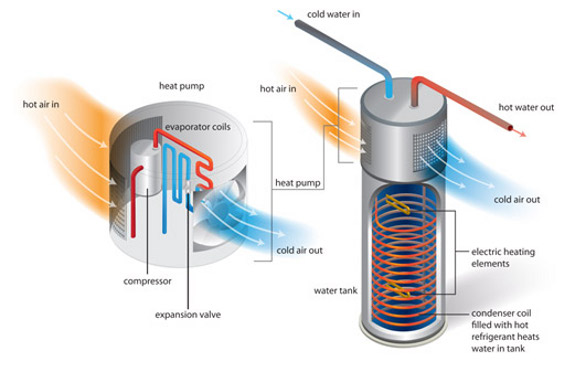
Hybrid heat pump hot water heater

We are currently weighing the
long term advantages of a Hybrid heat pump electric hot water tank.
There is a substantial 500
dollar rebate from the company providing electric that will eventually
go away.
Does any readers have any
first hand experience with this new technology?
Want more in-depth information? Browse through our books.
Or explore more posts by date or by subject.
About us: Anna Hess and Mark Hamilton spent over a decade living self-sufficiently in the mountains of Virginia before moving north to start over from scratch in the foothills of Ohio. They've experimented with permaculture, no-till gardening, trailersteading, home-based microbusinesses and much more, writing about their adventures in both blogs and books.
Want to be notified when new comments are posted on this page? Click on the RSS button after you add a comment to subscribe to the comment feed, or simply check the box beside "email replies to me" while writing your comment.

It's basically a fridge, but then turned inside out. So I would consider the technology of heat pumps to be pretty mature. According to this presentation [PDF] the yearly average coefficient of performance (“COP”) is at least 2 in the USA. That means that your electricity use for hot water will be around 1/2 of that of a conventional hot water heater. So you can calculate how long it will take to break even with the rebate, considering the higher cost of a hybrid heater.
From an environmental point of view, it is probably a good idea.
I assume you'll keep a wood stove as your primary house heater? Then you could maybe cycle some warm air from the woodstove to the hybrid heater in the winter. That should improve its performance. You would of course use some more wood in that case. The energy has to come from somewhere.
Ultimately they depend on electricity, right?
And there is the noise factor...
Back in my childhood, we had a gas-fired hot water heater with a tank, Which meant we only fired up hot water when we planned on taking baths. The dishes water must have been heated up on the stove. Only cold water for washing machine, which was a Savage automatic, with cycles that had to be manually set. We actually carried hot water upstairs, to add to the bath water, in the winter. Of course, baths were not daily then.
Here, our maybe t00-big hot water heater and tank keeps the basement pipes thawed, so there never is the risk of pipes freezing.
In Ontario we have "on demand" water heaters that only heat water exactly when you need it, they have no tank and can be installed under the sink or anywhere. Some homes have two or more just to keep them closer to the point of use.
Is the plumbing in a trailer exposed to outside? In cold climates its best to have all plumbing run in interior walls to avoid freezing.
Thanks to everyone for the feedback! A few specific answers:
Mom --- The air-flow heat pumps are loud, but I wouldn't think this type of heat pump would be as bad since you're circulating liquid instead of air. Definitely something to consider though and one of the biggest potential downsides. I'd love to hear more noise reports from folks who have them!
fwh (and Roland) --- "I'm not sure how much energy efficiency is there in the winter since you're cooling the air you just heated with your hvac or wood stove." Yep, that is the other big downside in the winter. (Although, on the upside, you get some free air-conditioning in the summer.) I doubt the efficiency numbers factor that in, and I wish they did!
Chris and fwh --- We actually started out researching on-demand hot water heaters. But it turns out that point-of-use water heaters aren't the most efficient in a lot of circumstances. POU wins if you use less than 20 gallons of hot water per day, or if you have hot water use that's quite a distance from the main system. (For example, bathrooms scattered around a big house.) But if you're in a smaller home, the efficiency numbers for heat-pump water heaters seem better.
Sure there are ways to improve the efficiency of the heat pump, or use the cool air it produces in summer. But those require extra infrastructure like ducts and valves and ideally some extra smarts in the computer controller inside the boiler. Maybe some extra fans as well.
The reality of most heaters is that they'll be stuck in a cupboard or basement and won't be looked at for years (if not decades) if they aren't broken.
The truth of the matter is that to use a heat pump optimally (especially for heating a house) you need a house that is designed for it. A modest, modern well-insulated home using radiant floor heating might need a 10 kW heat pump for heating purposes here in the Netherlands. For new houses here in the Netherlands, using a closed loop horizontal underground collector (buried about 3 ft deep) is popular. It's not as efficient as drilling a deep well [which needs to be around 600 ft deep for a 10 kW heat pump], but much cheaper. These ground-based systems can work in the winter as well. Heat pumps using air are only good down to an air temperature of about 5 °C (41 °F). Horizontal underground collectors can yield between 15 and 35 W/m² (18−42 W/yd²) in the soil types that prevalent in the Netherlands. Based on the same 10 kW heat pump, the collector would have to be between 230 and 550 yd², so you'd need a sizeabe plot.